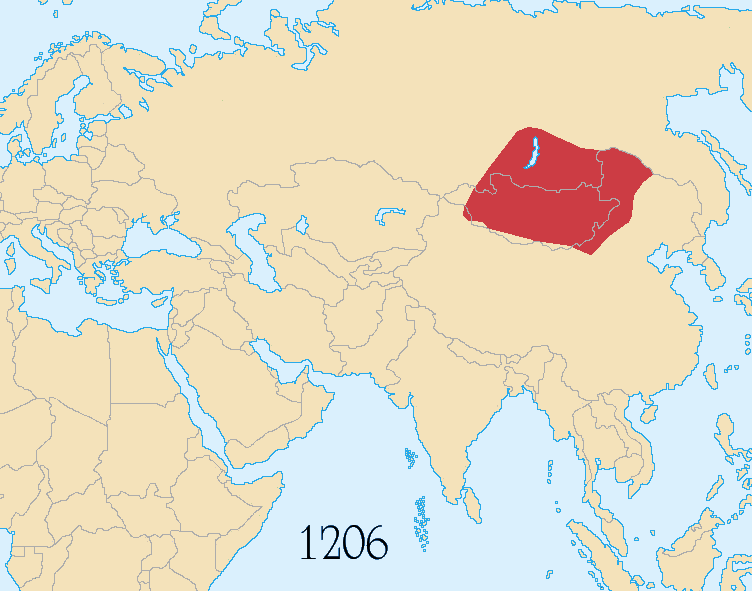The Mongols in China:
- Unified the north and south for first time in a long time
- Militarized China. We see the Chinese arming themselves (Mongols had banned weapons) as control loosened. The countryside fell into chaos. Multiple warlords cropped up in microeconomic regions, and the eventual victor (Zhu Yuanzhang) was in the richest of these regions (Jiangnan).
- Encouraged interchange of ideas, arts, culture (see culture post).
- Prohibited Chinese scholars from getting positions, so they turned to writing dramas and operas.
Okay, I need to tell this story. You know the word "kamikaze," right? But originally it did not mean a suicide-missioned pilot; it meant "divine wind" and referred to the storm that saved Japan from a Mongol invasion. Twice.
The Mongols had Korea and China, and Kublai wanted to enter into friendly relations with Japan. He wanted to send Japan a letter. Korea didn't want to send it; they had been suffering from "Japanese" pirate attacks for years. But Kublai knew how to twist Korea's arm, so they ended up sending the letter in 1266. The letter called for peace, saying ominously "nobody would wish to resort to arms." The Korean king appended the letter, saying that submitting would lead to prestige.
Japan said nothing but began fortifying defenses.
In 1268, Kublai sent another envoy. In 1269, he sent two more. 1271 and 1272, one each year. Nothing from Japan. The Japanese court was pretty terrified and wanted to surrender, but it was out of the emperor's impotent hands; the Kamakura shogunate (Tokimune) was in charge and ordered forces to be stationed at the most probable point of Mongol entry: Kyushu.
When the Mongols came in 1274, they landed on Kyushu a few times and just wiped the floor with the Japanese warriors. The Mongols were soldiers used to fighting in units; the Japanese had a tradition of one-on-one combat, even on a battlefield. Picture a lone samurai, expecting to fight just one Mongol at a time, yelling at the enemy--and getting shot by 10 arrows from all directions.
Then a storm came, and Mongol leaders told their troops to get in their boats (which had been made by Korean hands) so as not to be marooned. Smart move, that; about 200 ships were lost in what would later be called the Kamikaze, the storm that defended Japan. Japanese boats, which were better maneuverers, quickly finished off the remaining Mongol fleet. (wiki)
You'd expect the Khan to go back right away. Well, maybe he wanted to, but his navy had just been destroyed by wind. He needed time to build it up again. In the meantime, he sent embassies to Japan, telling them not to leave until they got a response. The shogun, after a while, decided to behead the ambassadors. Kublai, showing remarkable restraint for a Mongol whose ambassadors had just been killed, sent a few more. Same result; five heads came back.
In 1279, Kublai had conquered the Song (finally) and now had possession of their formidable navy. (Unfortunately, they picked riverboats to go to Japan in, and the Korean boats they commissioned were also unsuitable on the high seas.) In 1281, the Mongols landed once on Japan, but this time the samurai were much better trained to deal with them; the Mongols were forced back to their ships. All along the coast, they were repulsed, until finally, the second Kamikaze wiped out between 69-90% of the army.
Kublai was seriously put out, and he nearly planned another invasion, but didn't go through with it. Still, his historical impact on Japan was tremendous, even though the Mongols didn't actually succeed in invading.
- The shogun had no money to reward both the samurai he used and the priests (who claimed the Kamikaze was due to their prayers). He gave what little he had to the priests. The samurai, who were used to getting land after fighting, were discontent. They would stay dissatisfied with the Kamakura bakufu.
- This was a signal of the shift in power from the kuge (landed aristocrats) to the buke (the warriors, like those who had fought the Mongols).
- Kamakura became further unpopular due to the extra taxes it charged people for more defenses against a future invasion.
- The Hojo lineage used the occasion of the invasions to expand their power. They did this by promising more land to warriors, but they could not follow through. This was even more unpopular, and their power decreased.
- Pirates had taken advantage of the invasions to raid the countryside--people took this as further proof that the Kamakura bakufu couldn't do anything right.
- All in all, the invasions paved the way for Emperor Go-Daigo to make a play for power in 1333-1334, beginning the middle ages of Japan.
- Neo-Confucianized Korea. They invited Korean successors and scholars to Beijing, where they could meet Neo-Confucians from China and eventually take the ethos back. This changed Korean society from partly matriarchal to very patriarchal.
- Bad economic situation. Big landowners became bigger, especially if they allied themselves with the Mongols. Land was snatched away.
- as they militarized China, Korea also became more reliant on military. The next leader, Yi Songgye, rode to power in 1392. He was from a military family and he was a yangban. His goal was to strengthen the monarchy, a direct result of the Mongol vassalship that Korea had been in.
- Yeah, I really don't know much else about the effect of the Mongols on Korea. I should ask the TA.

